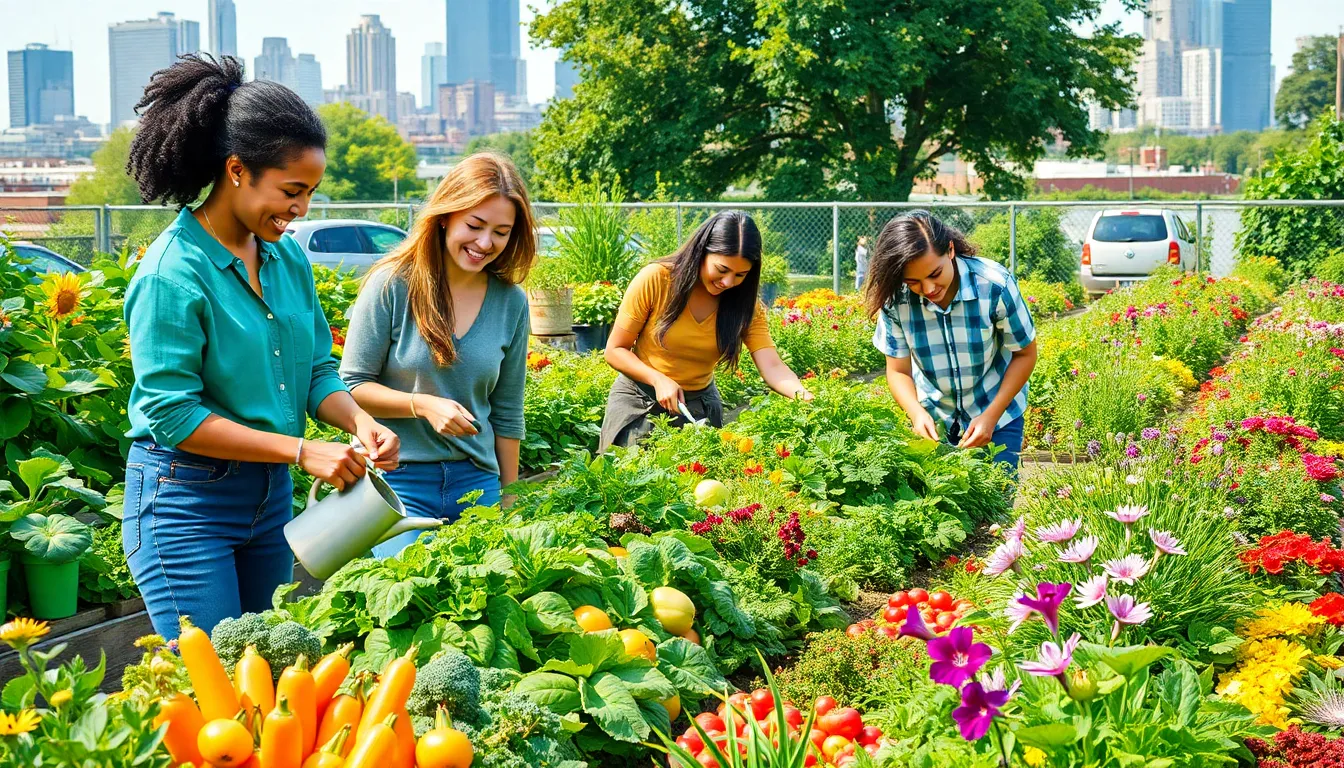In a world where concrete jungles reign supreme, urban gardening is like a breath of fresh air—literally. Imagine transforming a tiny balcony or a neglected patch of soil into a lush green oasis. Not only does it beautify the cityscape, but it also offers a buffet of benefits that’ll make anyone want to dig in.
From boosting mental health to reducing grocery bills, urban gardening is the superhero of sustainable living. It’s like having a green thumb without the need for a PhD in botany. Plus, who wouldn’t want to impress friends with homegrown tomatoes? So grab that trowel and let’s dig into the delightful perks of turning urban spaces into thriving gardens.
Benefits Of Urban Gardening
Urban gardening transforms limited spaces into green sanctuaries. Containers, raised beds, and vertical gardens allow city dwellers to cultivate plants in small areas. This practice promotes sustainability by reducing food miles and encouraging organic methods. People often experience enhanced mental health through interactions with nature. Studies indicate that exposure to green spaces leads to decreased stress and improved mood.
Fresh produce from urban gardens decreases grocery expenses. Growing fruits and vegetables like cucumbers and peppers directly in one’s backyard lowers food costs. Urban gardening fosters community connections. Neighbors often share tips, harvests, and gardening experiences, creating a sense of camaraderie. This connectivity strengthens local relationships and promotes the exchange of knowledge and resources.
Engaging in urban gardening can educate individuals about food systems. Participants learn about plant growth, seasonal cycles, and environmental impact. Additionally, maintaining a garden encourages physical activity. Tasks like planting, weeding, and watering involve movement that contributes to overall health.
Urban gardening also enhances food security. Homegrown produce provides access to fresh, nutritious options. Such gardens often address food deserts, offering alternatives in areas where healthy food choices are limited. These urban green spaces contribute to biodiversity, supporting pollinators and other local wildlife.
Overall, urban gardening delivers holistic benefits, bridging gaps between nutrition, environment, and community. Individuals can enjoy a deeper connection to their food and its sources through this rewarding endeavor.
Benefits of Urban Gardening

Urban gardening offers numerous advantages, enhancing not just individual well-being but also community vitality.
Environmental Benefits
Urban gardening significantly reduces carbon footprints. By growing food locally, it cuts down food miles, minimizing transportation emissions. Green spaces contribute to biodiversity, supporting pollinators like bees and butterflies. They help manage stormwater runoff, leading to improved urban air quality. Additionally, these gardens absorb carbon dioxide, contributing to climate change mitigation. Implementing composting practices within urban gardens strengthens soil health and reduces waste. Utilizing organic gardening methods promotes a pesticide-free environment, protecting local ecosystems.
Health Benefits
Engaging in urban gardening promotes physical activity, providing an effective cardiovascular workout. Individuals experience lower levels of stress and improved mental health through exposure to greenery. Gardening also encourages healthier eating habits, as individuals gain access to fresh produce. This practice often leads to heightened awareness of nutrition and food sources. Individuals involved in urban gardening frequently report increased feelings of community engagement and social connections. Gardening activities stimulate creativity and foster a sense of accomplishment. Furthermore, exposure to sunlight during gardening can boost vitamin D levels, enhancing overall health.
Economic Benefits
Urban gardening reduces grocery expenses significantly. Fresh produce grown at home eliminates costs associated with store-bought items. Sharing surplus harvests builds community ties and decreases food waste. Investing in gardening tools and supplies often yields long-term savings. Establishing local gardens can lead to increased property values in the surrounding area. Additionally, urban gardens create opportunities for small businesses and entrepreneurial ventures. Involvement in community gardens often attracts sponsorships and grants, providing further financial support. Families engaging in urban gardening report improved budgeting and financial management skills, making it a rewarding economic endeavor.
How to Start Urban Gardening
Starting urban gardening involves careful planning and consideration of space and resources. Urban spaces offer diverse opportunities for growing plants.
Choosing the Right Space
Selecting an appropriate area forms the first step in urban gardening. A sunny balcony, patio, or rooftop might provide ideal locations. Assess the sunlight each space receives, ensuring at least six hours daily for most vegetables. Consider proximity to water sources for easy access during watering. Community gardens also exist, offering shared plots for individuals lacking private spaces. Observing local climate conditions can inform plant selection, as hardiness zones affect growth patterns. Evaluating these factors enables successful gardening ventures.
Essential Tools and Materials
Gathering essential tools and materials constitutes the second phase of starting an urban garden. Basic gardening tools like trowels, pruners, and gloves ensure efficiency during gardening tasks. Containers or raised beds may facilitate space management while allowing proper drainage. Quality soil enriched with organic matter optimizes plant growth and nutrient absorption. Consider purchasing seeds or seedlings based on personal preferences and local growing seasons. Utilizing a watering can, hose, or drip irrigation system promotes efficient watering practices. Investing in these essentials prepares individuals for a rewarding gardening experience.
Community Impact of Urban Gardening
Urban gardening significantly strengthens community bonds by bringing people together through shared initiatives. Neighbors often collaborate on community gardens, fostering social interaction and allowing individuals to build friendships over common interests. Engaging in gardening projects invites diverse community members, regardless of age or background, to participate in nurturing their environment.
Contributing to local food security, urban gardens provide fresh produce in areas with limited access to nutritious options. These green spaces help reduce reliance on food markets, ensuring everyone can enjoy healthy fruits and vegetables. Educational opportunities arise as children and adults alike learn about sustainable practices and the benefits of local food systems.
Improved mental health manifests as community members come together in green spaces. Studies indicate that communal gardening reduces stress levels and enhances overall well-being. Urban gardens serve as peaceful retreats, encouraging mindfulness and connection to nature amidst bustling city life.
Urban gardening initiatives can also stimulate the local economy. By promoting small businesses such as farmers’ markets or garden supply stores, communities benefit financially. Increased property values often accompany well-maintained communal gardens, leading to enhanced neighborhood pride.
Ultimately, urban gardening encourages civic engagement. Residents become advocates for green spaces and environmental stewardship, leading to better urban planning and policies. Communities can thrive through gardening by intertwining ecological and social wellness.
These combined benefits underscore the vital role of urban gardening in creating vibrant, resilient neighborhoods.
Conclusion
Urban gardening stands as a powerful tool for enhancing urban living. By transforming small spaces into lush gardens, individuals not only improve their mental and physical well-being but also foster community connections. The practice encourages sustainable living and provides access to fresh produce, all while reducing grocery costs.
As city dwellers embrace urban gardening, they cultivate not just plants but relationships and knowledge about food systems. This holistic approach enriches lives and strengthens neighborhoods. With every seed planted, urban gardening paves the way for healthier, happier, and more connected communities.

